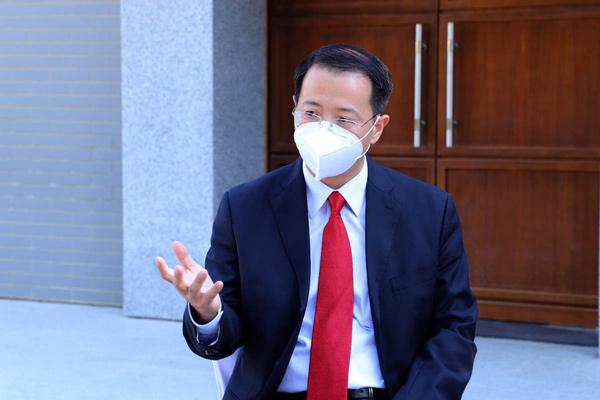- Local News
- Mon-2021-08-09 | 01:54 pm

Nayrouz News Agency :
Chinese Ambassador to Jordan Chen Chuandong on Sunday said that trade between China and Jordan has rebounded this year despite the coronavirus pandemic and the global rise in shipping costs.
Bilateral trade witnessed a remarkable recovery this year, reflected in the annual increase of 21.4 per cent, reaching $2.004 billion in the first half of the year, he said. Jordanian exports to China amounted to $235 million, an annual increase of 14.1 per cent.
Chuandong said, in an interview with the Jordan News Agency, Petra, that the volume of bilateral trade between the two countries set a record in 2019 amounting to $4.11 billion.
He noted that due to the coronavirus pandemic, trade volume fell in 2020 to $3.61 billion, witnessing a 12.08 per cent decrease.
Due to the pandemic, Jordan’s exports to China suffered a slight loss of $426 million, a decrease of 1.92 per cent.
The Chinese minister noted that China, with a population of 1.4 billion, is one of the most promising markets in the world. The estimated cumulative import of goods for the next 10 years is more than $22 trillion, according to the ambassador.
He stressed that economic and trade cooperation is an integral part of Sino-Jordanian relations and an important force in light of Jordan’s strategic location and gateway to trade in the Middle East, describing the Kingdom as "an oasis of stability in the region”.
He underlined the complementary economies of both counties and added that they have witnessed rapid developments in recent years.
China has become Jordan’s third largest trading partner and second largest source of imports. Chinese companies have invested in and implemented large-scale engineering projects in Jordan, the Chinese ambassador added.
Chuandong explained that trade between the countries was significantly affected during the pandemic’s early stages in 2020, which led to a global economic downturn and reduced consumption.
Additionally, the pandemic led to a decrease in human mobility due to international travel restrictions, which exacerbated the economic challenges, the envoy said.
He pointed out that the Chinese company, SDIC, invested in the Arab Potash Company and became its largest shareholder. Jerrash Holdings, owned by its affiliated company in Hong Kong became the first company listed on the Nasdaq Stock Exchange.
In the Arab world, Talal Abu Ghazaleh Organisation has invested in Chinese manufacturing and is already marketing its electronic products in the Middle East, the ambassador said.
Chuandong indicated that according to the 2019 Statistical Bulletin on Chinese Foreign Direct Investment issued by the Chinese government, the flow and stock of Chinese direct investment in Jordan increased significantly compared to its level 10 years ago.
In 2018, Chinese direct investments to Jordan reached a record level of about $85.62 million, the ambassador said.
He said that the Chinese government welcomes more Jordanian companies to invest and do business in China and also encourages competent Chinese companies to invest in Jordan. He expressed hope that Jordan would continue to provide "a successful and transparent business environment”.
In response to a question about the significance of the Belt and Road Initiative, he expressed China’s appreciation of Jordan’s active participation in the initiative and his country’s readiness to work with Jordan throughout the initiative’s development. The Chinese ambassador also expressed his country’s readiness to enhance economic trade and investment exchange, increase the communication levels and launch more cooperative projects to help Jordan overcome the pandemic.
He said that Jordan is a country with "a unique position” and important influence in the Middle East. China considers the Kingdom a major partner in the region and is ready to work with it and with other "brotherly Arab countries”.
Chuandong cited the importance of the first China-Arab summit scheduled for 2022 to enhance cooperation in the Belt and Road Initiative and work together to maintain peace and stability in the Middle East, support justice and promote mutual development.









